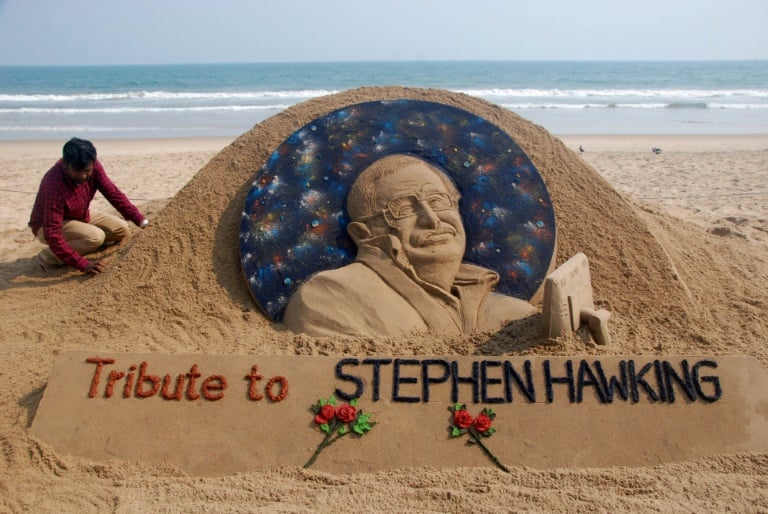The ashes of the theoretical physicist were interred by the graves of fellow science greats Isaac Newton and Charles Darwin.
A message from late British astrophysics giant Stephen Hawking was beamed towards the nearest black hole on Friday as his remains were laid to rest in London’s Westminster Abbey.
With celebrities and science enthusiasts from around the world in attendance, the ashes of the theoretical physicist were interred by the graves of fellow science greats Isaac Newton and Charles Darwin.
Deborah Trevino, 65, who came from Las Vegas with her husband for the ceremony, said the wheelchair-bound scientist was “one of those minds that should always be remembered”.
READ MORE: Stephen Hawking: a brief history of genius
A specially-written musical piece by Greek composer Vangelis featuring Hawking’s famous synthesised voice was beamed into space by radio waves from a European Space Agency satellite dish in Spain.
The ESA said the six-minute message, which is drawn from a speech Hawking gave about preserving the planet, was being transmitted towards the black hole 1A 0620-00, which was discovered in 1975, and is located 3 500 light years from Earth.
“This is a beautiful and symbolic gesture that creates a link between our father’s presence on this planet, his wish to go into space and his explorations of the universe in his mind,” said his daughter Lucy Hawking.
“It is a message of peace and hope, about unity and the need for us to live together in harmony on this planet,” she said.
Hawking, who suffered from Motor Neurone Disease, dedicated his life’s work to unravelling the mysteries of the universe and fought to overcome his disability.
The memorial stone placed on top of Hawking’s grave included his most famous equation describing the entropy of a black hole.
“Here Lies What Was Mortal Of Stephen Hawking,” read the words on the stone, which included an image of a black hole.

Hawking, who captured the imagination of millions around the world, died on March 14 at the age of 76.
Propelled to stardom by his 1988 book “A Brief History of Time”, an unlikely worldwide bestseller, Hawking’s genius and wit won over fans from far beyond the rarefied world of astrophysics.
His death triggered a flood of tributes from Queen Elizabeth II to Nasa, reflecting his impact as a scientist, but also a beacon of hope for people affected by motor neuron disease.
The British government announced on Monday that exceptional students in mathematics and physics could compete for research fellowships in Hawking’s honour.
An avowed atheist, Friday’s service was nonetheless held at London’s giant Westminster Abbey to accommodate large numbers of family, friends and colleagues.
It celebrated not only his achievements as a scientist, but also his character and endurance living with a devastating illness.
“We are so grateful to Westminster Abbey for offering us the privilege of a service of thanksgiving for the extraordinary life of our father and for giving him such a distinguished final resting place,” said his children Lucy, Robert and Tim.
Around 1 000 members of the public drawn from more than 100 countries attended the service, following an online ballot in which 25 000 applied for tickets.
Applicants needed to give their birth date – but eagle-eyed fans spotted it could be any day up to December 31, 2038, opening the door to time-travelling guests from the future.
Mourners at the service were welcomed by volunteers from the London 2012 Paralympic Games opening ceremony, in which Hawking starred.
British astronaut Tim Peake, astronomer royal Martin Rees and actor Benedict Cumberbatch, who played Hawking in a television film and narrated his documentaries, delivered addresses.
Three young people who use electronic communication devices to speak, just as Hawking did, were also among the guests.
“He has inspired me to be the best that I can be and not let anything, including my disability, hold me back,” said Jason Felce, 20, who controls his equipment with eye movement.
Drama student Rose Brown, 20, was hit by a drink-driver in 2009.
“I am going to be an actress. Everybody who puts their mind to something gets to be it. Stephen Hawking proves this more than anyone,” she said.
Download our app